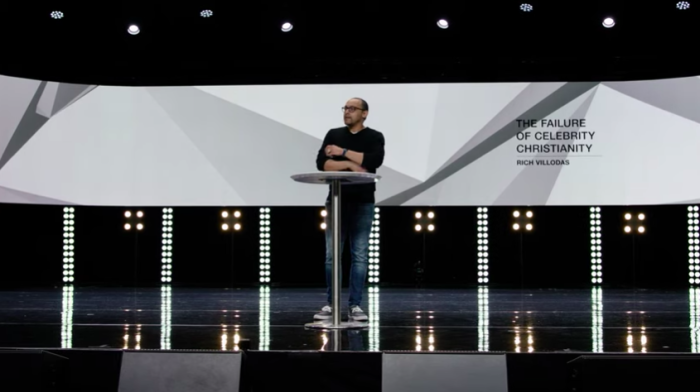Pastor Rich Villodas laments celebrity culture invading churches: 'Disease of the soul'

Pastor Rich Villodas weighed in on the dangers of “celebrity-ism” that has infiltrated many churches and highlighted the role every Christian has to play in combating the ideology he warned is “incompatible with the Christian faith.”
“Generally speaking, celebrity and Christianity are not necessarily contradictions in terms because notions of celebrity are often projected onto people,” Villodas, the Brooklyn-born lead pastor of New Life Fellowship, said at the Q 2021 Culture Summit on April 22.
Jesus Himself could be regarded as a celebrity in the first century, he said: “Wherever Jesus went, throngs of people followed him, Jesus of Nazareth was a household name. You can be sure that people asked Him to sign their tunics and autograph their parchment paper. Jesus was very known in those parts.”
The problem, then, is “celebrity-ism and Christianity,” Villodas emphasized.
“Christian celebrity-ism is failure with regard to our witness before Jesus because it's trapped in the lie that mass appeal equals maturity, that influence equals integrity, that charisma equals character,” he explained.
“Celebrity-ism creates a culture in which self-proclaimed influencers assume the role of spiritual mothers and fathers,” he said. “Celebrity-ism is deceptive and incompatible with Christian faith because it locates authority in the number of followers and blue checks next to our names. Celebrity-ism is not found in the crowds, but in the soul and in the environments that reinforce it. It's a sickness of the soul and a disease of the system.”
The Deeply Formed Lifeauthor noted that in the wilderness, Satan tempted Jesus to “build a ministry that would be based on a kind of ancient celebrity-ism," one not rooted in “self-giving love but in spectacular showmanship.”
“The story shows us that the celebrity-ism that we are tempted with is one that's marked by entitlement, one that's marked by performance, one that’s marked by power,” he contended.
“Entitlement is found in the expectation that I deserve to be treated differently. Performance is oriented around the lie that my sense of self is predicated on the attention and affirmation of the crowd. This notion of power is expressed in the incessant need to advance my personal agenda, and this is a sickness of the soul.”
Celebrities don’t form on their own — and behind every celebrity pastor is an adoring congregation that both loves and supports the celebrity atmosphere. Similarly, the development of a celebrity culture also doesn't happen overnight. Rather, it begins when a pastor has a “driving ambition for fame, but it can't take root unless the congregation supports that ambition,” the pastor said.
“Unfortunately, many people want their pastor to be a spiritual hero or celebrity at some level,” he said.
Villodas stressed that celebrity-ism is not monopolized by megachurches or big names, adding: “I’ve seen all kinds of leaders and small churches and medium-sized churches act like they're part of the royal family.”
For the health of the Body of Christ, celebrity-ism “must be resisted,” and that will require every believer asking themselves four questions.
- Have I wrestled honestly with the entitlement I carry?
- Am I submitting myself to authority willingly, joyfully and transparently?
- Am I regularly proximate to people I'm not gaining any social capital from?
- Am I living from the center of God's affirming, unconditional love?
The pitfalls associated with “celebrity pastors” have been the focus of much discussion in recent years amid the public downfall of well-known Christian leaders, including former Hillsong pastor Carl Lentz and legendary apologist Ravi Zacharias.
New York pastor and author Tim Keller told The Christian Post that when pastors get to be “well-known,” the praise can turn their heads, the criticism can prompt self-pity, and the overwork can cause them to neglect their prayer life.
“For all those reasons, very often, so-called ‘celebrity ministers and figures’ very often live lives less consistent with the Christian faith than Christians who are not so famous,” Keller said.
“It's the job of the so-called ‘famous Christians’ to just live ordinary, good Christian lives, and not overwork and burn out and get filled with self-pity and anger over all the people that are criticizing them. That’s the thing that sets them up for these things where they embezzle money, they have affairs or they do things like that.”
While Christian leaders who have “not been faithful or responsible with the platform God has given them” must be held accountable, Keller stressed their moral failure “doesn't mean that the Christian faith doesn't work.”
“A quack doctor doesn't mean that medicine is illegitimate. A quack evangelist doesn't mean that the Gospel isn't true. So on one hand, don’t make excuses for your heroes. On the other hand, it doesn’t mean that everything they’ve ever said is illegitimate,” he said.





























